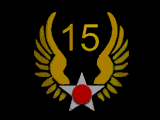NARRATION OF
DECEMBER 12, 1944 MISSION OF VICTOR BAHR CREW
15TH Air Force in Italy: The weather couldn't have been worse, which
was good. Thick mist, a natural weapon
against lurking fighters, gave the Liberator crew a feeling of reassurance as
they took off into the dismal sky. It
helped offset the nervous anticipation of a long and lonely trip – Blechhammer,
Germany.
It didn't
matter that they'd be unable to see the vital oil refineries. This was a radio instrument bombing mission.
The men had been thoroughly briefed and trained for one of the pioneering
efforts in the use of a new technique developed by the Fifteenth Air Force.
So,
although it meant extra work for the Navigator, Lt. Frank Clark of Santa
Monica, Calif., "Kansas City Kitty's" crew welcomed the bad weather, felt
comparatively safe as pilot, Victor A. Bahr, Long Bottom, Ohio, set the bomber
on course and headed it through the solid overcast.
They
crossed the Adriatic, climbed to avoid the rugged mountains looming in
Yugoslavia. Though the crew was comfortably warm in electrically heated flying
suits, the air was unimaginably cold, 45 below.
Suddenly,
T/Sgt George W. Spuda, Wauwatosa, Wis., the Engineer, noticed ice forming on
the wing tips. At once it caused a NEW feeling - - - apprehension. An extra
weight, demanding more power from the engines, using more gas than could be
spared and the de-icer failing to function!
Almost
simultaneously, oil began leaking from #2 engine, and now it too was freezing
solid and coating the tip of the engine nacelle. Germany below!
Over the
target, they drew a heavy barrage of flak, but that wasn't a big worry. The
bursts were dull – they knew it wasn't too close.
Through the
heavy clouds, the target area was X-rayed, exposed for attack. Accurate,
thorough calculation and the bombs tumbled Earthward, would not be wasted.
The job
done, only objective remained - - - GETTING HOME. The fuel supply had dwindled rapidly. Oil continued leaking from
#2 engine. It had to be feathered. To have made it back under all four engines
would have been a terrific task under such circumstances. Now, three engines were using more gas than
four ordinarily consumed.
And the
load of ice was getting heavier, weighting down the wings and covering the
stabilizer. Several thousand feet below there was wormer air that might melt
away the burden, but they had to stay level at 10,000 to clear the mountains.
Lt. Bahr
had long ago realized that he could not make the home base. Now it seemed as if
they wouldn't even be able to cross the Adriatic. Ditching was a nasty business. Better to chance a landing in
Yugo.
The Radio
Operator, T/Sgt Nicholas Mandella, Hempstead, L.I., checked on weather
conditions at a nearby field. Reply:
"Rain, ceiling 2000 feet, strong crosswind."
On a good day, with the winds just right, a bomber might make it safely.
But this was a miserable – wild winds.
In the
waist, the men prepared for the worst, set up the crash belt, braced themselves
– tensed.
In order to
send the big bomber on the edge of the runway, the pilot eased her down a
hillside. Must try to get the full benefit of the strip. As he got ready to cut the power and hit the
ground, the cross wind picked the plane up as if it were a kite, and literally
tossed it sideways into the air. He held on grimly, brought it down again, and
this time the bomber came to Earth, left tire blew out, belly scraped the steel
matting. The plane veered off the
runway into a vineyard patch and halted with a sudden jolt.
Instinctively,
the crew leaped from the plane and ran, expecting to hear that dreaded roar as
the ignited gas explodes and bursts into flames. They hit the dirt – and waited.
Nothing happened – they went back for their equipment.
"Kansas
City Kitty", was a total loss. The left landing gear was disabled, and the
entire nose section into a tangled mass of wires, twisted metal, caved in
doors. A miracle that no one had been
hurt. But the crew still insisted: on
such a mission, bad weather is good – provided, everything works perfectly.
|



